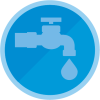Environmental Communication for Behavior Change
This course provides environmental professionals with a practical introduction to the strategies, methods, and tools of environmental communication that effectively lead to changes in behavior, primarily using social marketing. The field-based skills gained through this course will benefit all practicing environmental professionals faced with the challenge of changing behaviors.
Most often environmental professionals face problems and apply well-developed planning, management, engineering, and scientific principles to address their problems. The premise of this course is that most environmental problems are caused by human behavior and have long-term implications. To address and create long-term solutions to these problems, behavior needs to change. The newly emerging field of environmental communication brings together a set of behavior change tools that can help with environmental enforcement, compliance with regulations, and desired changes in behavior when no policy or law exists to force that behavior. Students will be exposed to the very fast growing set of resources – papers, publications, case studies, people, and programs that offer assistance in addressing behavior change questions. Students will develop a plan targeted to one specific audience and aimed at changing one behavior.
The course is seven weeks in length and is taught in an entirely online, distance learning format, with both asynchronous and synchronous portions. No campus visits are required. Depending upon enrollment, we anticipate offering 1-2 times each week that you can interact with instructors and classmates via Zoom.
Note: Zoom dates and times are determined by student and instructor availability. Student availability will be assessed by a poll 3-6 weeks prior to the course. For more information on Zoom dates, please email us at execed@nicholas.duke.edu.
A different theme within the topic of environmental communication will be addressed each week:
Week One: Technology Orientation and Materials Overview
This week Duke staff will hold a practice session using the Webconference technology and walk-through the course material platform. It will also be a good time to test out all the technology and ask any logistical questions for the course. Instructor Brian Day will not be present.
Week Two: What is Behavior Change and Social Marketing?
This week is meant to help us all get our heads around what we mean by behavior change and social marketing. It is also about taking the time to identify one specific project to focus on in this course. It will be a time to get to know each other as well.
Week Three: Introduction to Environmental Communication, Behavior Change and Social Marketing
What is it? How can we use it? Can you really change behavior? How does social marketing work at the community level? How can planners use it to address specific local problems?
Week Four: Behavior Change on Environmental Issues
Environmental social marketing differs from communication in that is is extremely audience focused and deeply rooted in research. What are the main theories of behavior change and how do they apply to our work as environmental professionals? This week is dedicated to starting the serious process of understanding the steps of developing a campaign to change behavior..
Week Five: Designing a Campaign and the Importance of Research
This week focuses on completing your marketing plan and integrating the creative elements that make your campaign successful.
Week Six: Policy Change & Advocacy
Often as environmental professionals, we are trying to enact or implement new policy. How do we effectively apply these behavior change ideas to policy? How do we get our messages to the right audiences? How do we get otherwise disinterested policy-makers to pay attention? How do we create a sense of urgency?
Week Seven: Students take this week to work on their Final Paper
In lieu of a formal class, instructor Brian Day will host an online “office hours” session. Students may log in to ask questions or receive feedback on their final projects
